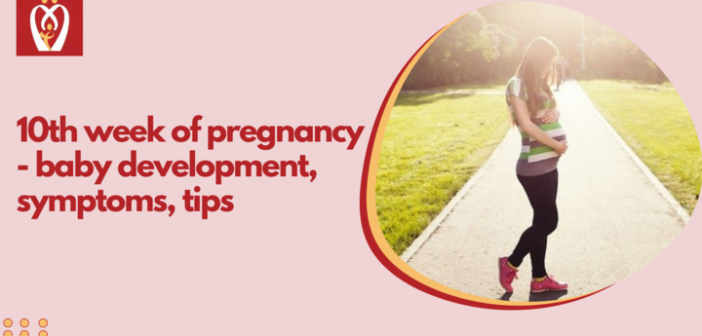Now that you’ve reached the 10th week of pregnancy, you may no longer wonder when you’ll look pregnant, because it’s probably not far away! That’s why shopping in the 10th week of pregnancy is a smart idea. Shop for some new, looser clothing while you’re at it—and maybe your first maternity wear. But don’t go overboard while you’re shopping. In order to keep up with your changing physique, you’ll need to have a few extra basics on hand. Remember that your body will continue to alter for the foreseeable future.
You and your baby achieved a significant milestone this week: the baby is no longer an embryo but is now officially a fetus. As your 10-week old fetus becomes more baby-like, you’re getting closer to the end of the first trimester’s unpleasantries.
10th Week of Pregnancy: The Development of the Unborn Child
By the 10th week of pregnancy, your baby has grown to a length of around a quarter, which is about an inch and a half. You should expect your baby to develop to around 3 inches in length by the end of the first trimester—about the length of kiwi fruit. Arms and legs aren’t included in this measurement at all. The reason for this is that throughout the first trimester, your baby is measured from head to toe.
- All of your baby’s critical organs have developed by the start of the 10th week of pregnancy.
- The embryonic tail located at the bottom of his spinal cord has disappeared.
- His skeleton is still expanding. The bones of your infant look white during an ultrasound.
- His ears are nearing completion at the 10th week of pregnancy.
- His eyelids and tooth buds are beginning to form.
- Around the 10th week of pregnancy, his testes begin producing testosterone.
- Fingers and toes are completely distinct (no more webbing).
In addition, your baby’s brain develops at a rapid pace throughout this time. Every minute, 250,000 new neurons (the earliest brain cells) are created.
10th Week of Pregnancy: How Your Body Is Changing
Even as your baby’s body continues to change, so does your own. As soon as you’re 10 weeks pregnant, you’ll notice:
- You feel a tightening in your lower abdomen. Your uterus may be expanding, or you may be seeing an increase in blood flow. You may also find that you need to urinate more often under this stress.
- Pregnant women may detect changes in their eyes around the 10th week of pregnancy.
- Eyelids grow a little thicker because of this change in cornea thickness. Pregnancy causes a buildup of fluid in the body.
- Pregnancy may cause dry eyes and swollen eyelids.
After giving delivery, your eyes will recover to their pre-pregnancy state.
Consult your GP if you have sudden or severe changes in your eyes, such as seeing spots or having your vision become blurry. Your GP may want to check for diabetes and high blood pressure as well. This list of signs and symptoms may not appear at all.
The Belly during the 10th week of pregnancy
Your 10-week pregnant tummy may be just beginning to show. This is because your baby’s quick development has caused your belly to begin to acquire some additional curvature. At approximately 10 weeks pregnant, even if you don’t seem to be pregnant to others, you may require some jeans with an elastic waistline and some loose-fitting blouses.
Pregnant women with a normal BMI are advised by several GPs to gain one to five pounds during the first trimester. Gaining a few pounds at 10 weeks of pregnancy is quite normal.
If you’re expecting twins, your GP may advise you to gain one pound every week, which means you’ll have gained 10 pounds by the time you’re 10 weeks pregnant with twins or more. That said, don’t worry about how much weight you gain or lose due to morning sickness; this is normal. When nausea subsides in the second trimester, you should be able to gain weight again.
10th Week of Pregnancy: Tips
To prevent nausea, eat a meal as soon as you wake up.
The phrase “morning sickness” comes from the fact that nausea is generally stronger in the morning. Before you even get out of bed, have some granola bars or saltine crackers on hand. You may find that it eases the symptoms of morning sickness.
Don’t forget to take your supplements.
Pregnant women need to take their prenatal vitamins and eat a diet rich in vitamin-rich foods since they’re bringing new life into the world. Vitamins D, C, and A, as well as folic acid, DHA, iron, calcium, and potassium, are all essential for a healthy diet.
Fill up on the right foodstuffs.
A healthy diet may help you and your fetus obtain the vitamins and minerals they need, and it can also make you feel better. Protein and important elements in eggs and nuts keep hunger at bay, while mangoes and bananas are rich in potassium, which helps alleviate nausea.
The Nurturey Pink Book, a digital alternative to the NHS Redbook, has all the tools you will need as an expecting parent! Tools like managing your prenatal tests, scheduling appointments with your GP, kick counter, timeline, receiving trusted NHS guidance and so many more features come in the Pink Book, a must-have for all parents! Learn more at https://nurturey.com/
